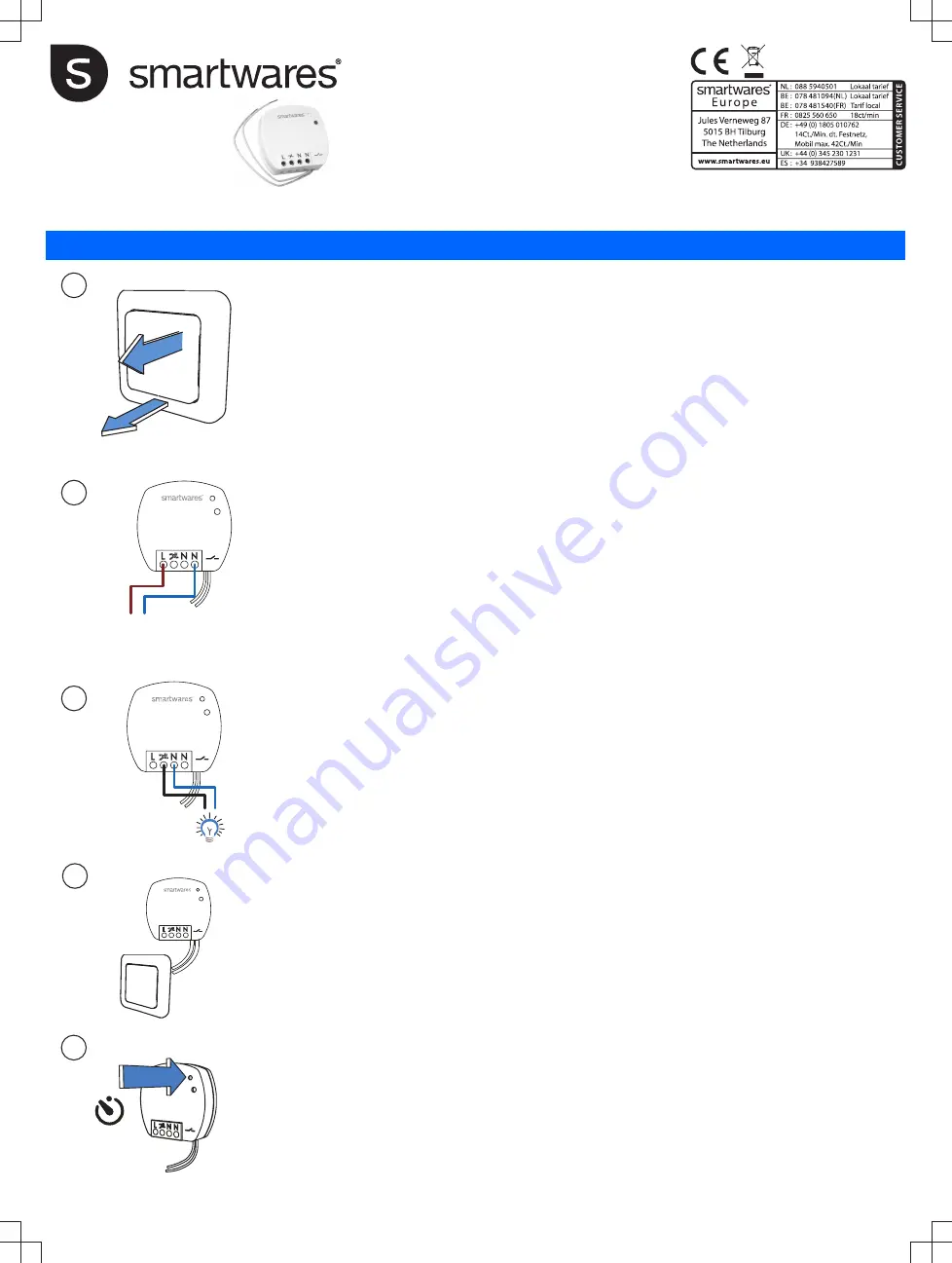
EN
Built-in dimmer and switch
NL
Inbouwdimmer & schakelaar
DE
Einbau-Schalter mit Dimmer
FR
Récepteur encastrable avec variateur
ES
Regulador incorporado conectable
IT
Interruttore dimmerabile da incasso
SV
Inbyggd dimmer
PL
Wbudowany ściemniacz i przełącznik
10.037.37
EN
Instruction manual
PREPARATION BEFORE USE
In your electrical circuit panel, locate the circuit breaker control for the
wall switch you will be working on.
Switch the circuit off.
CONNECTING THE BUILT-IN SWITCH
The built-in switch is designed to be placed behind an existing wall
switch.
Remove and disconnect the wall switch behind which you want to
place the built-in switch
(1)
.
NOTE: The built-in switch only works on single pole switches, it does
not work on multiway switching.
Connect the built-in switch to the power supply (2):
Connect the phase wire (brown) to L.
Connect the neutral wire (blue) to N.
Connect the built-in switch to the lamp (3):
Connect the neutral wire (blue) of the lamp to N.
Connect the hot wire (black) to χ.
NOTE: The neutral wire may not always be present in the wall junction
box and needs to be installed in order for the product to work.
Connect the built-in switch to the wall switch (4):
Connect the two white wires of the built-in switch to the wall switch.
Attention!
- The wall switch itself should not be connected to the mains power,
the walls witch should only be connected to the white wires of the built-
in switch.
Switch on the mains power in your electric circuit panel.
PAIRING/DISCONNECTING
Pairing the receiver with a sender
A. Press and hold the ”LEARN” button
(5)
on the built-in switch for 3
second to put it in pairing mode. The LED on the built-in switch will
blink.
B. Press the “ON” button on the sender that you want to pair.
ð
The lamp you have connected will turn on.
C. Repeat these steps for any other sender. You can pair a maximum
of 6 senders to the receiver.
Disconnecting a link
Follow above procedure, but during step B press the “OFF” button on
the sender.
Disconnecting all links
A. Press and hold the ”LEARN” button
(5)
for 7 seconds until the LED
starts to blink.
ð
All links are disconnected.
OPERATING SENDERS
A. Press the “I” / ”ON” button on the sender to turn on the receiver.
B. Press the “0” / “OFF” button on the sender to turn off the receiver.
Operating a dimmer receiver
A. Press the ”ON” button on the sender to turn on the dimmer to the
last set dim level.
B. When the dimmer is turned on: briefly press the “ON” button to dim
the light; press the “ON” button again to stop the dimming.
C. Press the “OFF” button on the sender to turn off the dimmer.
FR
Manuel d'instructions
PRÉPARATION AVANT UTILISATION.
Dans votre panneau de circuit électrique, localisez la commande du
disjoncteur pour l'interrupteur mural sur lequel vous allez travailler.
Coupez le circuit.
CONNEXION DE L'INTERRUPTEUR INTÉGRÉ
L'interrupteur intégré est conçu pour être placé derrière un interrupteur
mural existant.
Retirez et déconnectez l'interrupteur mural derrière lequel vous voulez
placer l'interrupteur intégré
(1)
.
REMARQUE : L'interrupteur intégré ne fonctionne que sur les
interrupteurs unipolaires, il ne fonctionne pas sur les interrupteurs
multidirectionnels.
Raccordez l'interrupteur intégré à l'alimentation (2) :
Connectez le fil de phase (marron) à L.
Connectez le fil neutre (bleu) à N.
Connectez l'interrupteur intégré à la lampe (3) :
Connectez le fil neutre (bleu) de la lampe à N.
Connectez le fil chaud (noir) à χ.
REMARQUE : Le fil neutre peut ne pas être toujours présent dans la
boîte de jonction murale et doit être installé pour que le produit
fonctionne.
Connectez l'interrupteur intégré à l'interrupteur mural (4) :
Connectez les deux fils blancs de l'interrupteur intégré à l'interrupteur
mural.
Attention !
- L'interrupteur mural lui-même ne doit pas être connecté au secteur,
les interrupteurs muraux ne doivent être connectés qu'aux fils blancs
de l'interrupteur intégré.
Branchez le courant sur votre panneau de circuit électrique.
COUPLAGE / DÉCONNEXION
Couplage du récepteur à un émetteur
A. Appuyez sur la touche « LEARN » et maintenez-la enfoncée
(5)
sur l'interrupteur intégré pendant 3 secondes pour le mettre en
mode couplage. La LED sur l'interrupteur intégré clignote.
B. Appuyez sur le bouton « ON » de l'émetteur que vous voulez
coupler.
ð
La lampe que vous avez connectée s'allume.
C. Répétez la procédure pour tout autre émetteur. Vous pouvez
coupler un maximum de 6 émetteurs au récepteur.
Déconnexion d'une liaison
Suivez la procédure ci-dessus, mais pendant l'étape B, appuyez sur le
bouton « OFF » de l'émetteur.
Dissociation de tous les liens
A. Appuyez sur la touche « LEARN » et maintenez-la enfoncée
(5)
pendant 7 secondes jusqu'à ce que la LED commence à clignoter.
ð
Tous les couplages sont annulés.
FONCTIONNEMENT DES ÉMETTEURS
A. Appuyez sur la touche « I » /« ON » de l'émetteur pour allumer le
récepteur.
B. Appuyez sur la touche « 0 » / « OFF » de l'émetteur pour
désactiver le récepteur.
Utilisation d'un récepteur-variateur d'intensité lumineuse
A. Appuyer sur la touche « ON » de l'émetteur pour allumer le
variateur d'intensité lumineuse au dernier niveau de luminosité
réglé.
B. Lorsque le variateur d'intensité lumineuse est allumé : appuyer
brièvement sur le bouton « ON » pour diminuer la lumière ;
appuyer à nouveau sur le bouton « ON » pour arrêter la
diminution.
C. Appuyer sur la touche « OFF » de l'émetteur pour désactiver le
variateur d'intensité lumineuse.
1
2
3
4
5
220-240 VAC
50/60Hz
Specifications:
Max. wattage: 100W
Frequency: 433.92MHz
Input AC Voltage: 220V ~ 240V, 50/60Hz






















